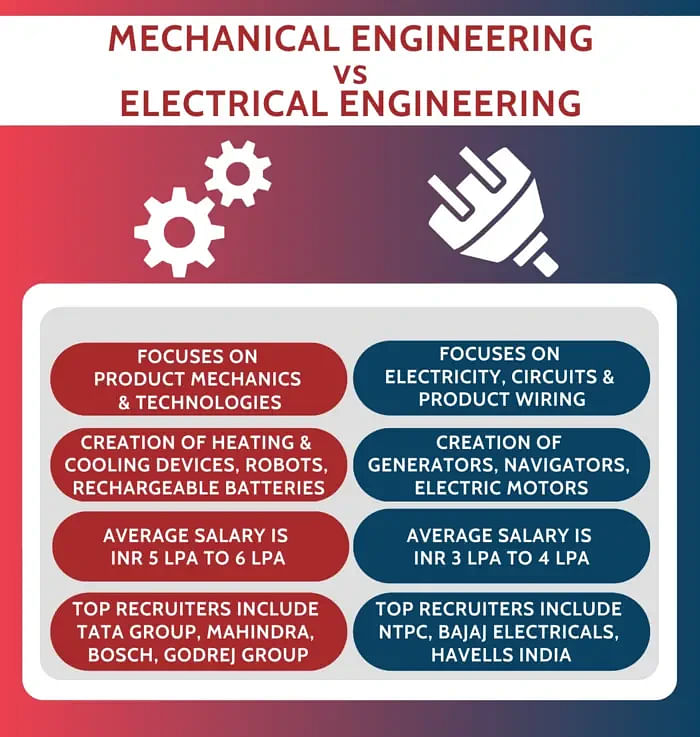Mechanical engineering is a field of science that deals with the concepts of physics, design, and mathematics, while electrical engineering deals with electrical systems and technology.
Table of Contents
- What is Mechanical Engineering?
- What is Electrical Engineering?
- Eligibility Criteria for Mechanical Engineering vs Electrical Engineering
- Differences Between Mechanical Engineering vs Electrical Engineering
- Top Colleges for Mechanical Engineering vs Electrical Engineering
- Career Scope for Mechanical Engineering vs Electrical Engineering
- Top Recruiters for Mechanical Engineering vs Electrical Engineering
- Which is Better: Mechanical Engineering vs Electrical Engineering?
Mechanical Engineering teaches students about thermodynamics, mathematics, physics, design & material science, while electrical engineering teaches students about electronics, systems and power sources. To study these subjects, students must be 12th pass with 60% at least in the science stream.
A mechanical engineer focuses on manufacturing, designing and producing a product, while an electrical engineer focuses on creating circuits and enhancing the development.
What is Mechanical Engineering?
Mechanical engineering combines concepts from physics, design, thermodynamics, mathematics, and materials science to develop modern, functional machinery. A mechanical engineer structures & produces while improving machinery.
Many industries employ mechanical engineers, such as computer manufacturing, construction, scientific research, and transportation. A mechanical engineer creates machines that include heating and cooling devices, robots and rechargeable batteries, medical devices, aeroplanes, and roller coasters.
Also Check: List of Engineering Branches in India 2023
What is Electrical Engineering?
Electrical engineering is a field that concentrates on designing electrical systems. Electrical engineers work with electrical circuits and power sources to create and enhance products. They work in industries like technology, communications, construction, and manufacturing. Electrical engineers develop products like Broadcast, Generators, Navigation, Public Utilities, and Electric motors.
Also Check: 100+ Electrical Engineering Seminar Topics for Students
Eligibility Criteria for Mechanical Engineering vs Electrical Engineering
Mechanical engineering & civil engineering have very similar requirements as an engineering specialisation. The entry requirements for mechanical engineering vs civil engineering are stated below.
- Candidates must study PCM or science stream in their 10+2 with 60% from a recognised board for a bachelor's degree. Sometimes, candidates must even have a diploma certification for electrical engineering courses.
- Students must score the engineering entrance exams cutoffs or more for admission to top engineering colleges in India.
- Candidates must score at least 50% in their bachelor's degree for admission to masters in engineering courses.
- Students must clear engineering entrance examinations like JEE Main & JEE Advanced, BITSAT, VITEEE, WBJEE, SRMJEEE etc.
Also Check: Mechanical Engineering Courses After 12th
Differences Between Mechanical Engineering vs Electrical Engineering

In between mechanical engineering and electrical engineering, mechanical engineering is more inclined toward the mechanical aspects, while electrical engineering is more inclined toward the wiring systems of a product. Below given are the differences between mechanical engineering and electrical engineering.
- Specializations: In mechanical engineering courses, students are taught about product mechanics and technologies, while in electrical engineering, students learn about electricity, circuits, and wiring of a product.
- Focus Area: Mechanical engineering focuses on creating sustainable mechanics of a product, while electrical engineering is more focused on the electronics of a product.
- Eligibility: Candidates must pass 10+2 from a recognized board, while some universities hold a diploma certification.
- Responsibilities: Mechanical engineers work on a product's outer part and related equipment. In contrast, Electrical engineers work on the internal wiring of a product.
Also Check: Seminar Topics For Electrical Engineering
Top Colleges for Mechanical Engineering vs Electrical Engineering
Mechanical Engineering and Electrical engineering are engineering specialisations taught in top engineering colleges in India. Candidates can go through the engineering specialisations specified below.
Mechanical Engineering Colleges
The top mechanical engineering colleges include IITs, NITs, etc. Candidates can find the best mechanical engineering colleges stated below.
| NIRF Ranking 2023 | College Name | Course Fees |
|---|---|---|
| 1 | IIT Madras | INR 4,50,000 |
| 2 | IIT Delhi | INR 4,55,000 |
| 3 | IIT Bombay | INR 4,00,000 |
| 4 | IIT Kanpur | INR 4, 60,000 |
| 5 | IIT Roorkee | INR 6,24,000 |
| 6 | IIT Kharagpur | INR 4,30,000 |
| 7 | IIT Guwahati | INR 8,71,000 |
| 8 | IIT Hyderabad | INR 6,35,000 |
| 9 | NIT Trichy | INR 6,47,000 |
| 10 | Jadavpur University | INR 8000 |
Also Check: Top Mechanical Engineering Colleges in India
Electrical Engineering Colleges
The top electrical engineering colleges include IITs, NITs, etc., as it is an engineering specialisation. Candidates can find the best mechanical engineering colleges stated below.
| NIRF Ranking 2023 | College Name | Course Fees |
|---|---|---|
| 1 | IIT Madras | INR 4,50,000 |
| 2 | IIT Delhi | INR 4,55,000 |
| 3 | IIT Bombay | INR 4,00,000 |
| 6 | IIT Kharagpur | INR 4,30,000 |
| 7 | IIT Guwahati | INR 4,50,000 |
| 8 | IIT Hyderabad | INR 2,50,000 |
| 9 | NIT Trichy | INR 3,50,000 |
| 13 | Anna University, Chennai | INR 2,00,000 |
| 15 | IIT Varanasi | INR 2,45,000 |
| 25 | BITS, Pilani | INR 10,67,000 |
Also Check: Top Electrical Engineering Colleges in India
Career Scope for Mechanical Engineering vs Electrical Engineering
As mechanical and electrical engineering is an engineering specialisation, the career scope in each stream is very promising. An average mechanical engineer earns at least INR 4.3 L annually, while electrical engineers earn up to INR 3 LPA annually as their base salary. Candidates can find stream-wise engineering job roles with salaries stated below.
Mechanical Engineer
Students can earn up to INR 11 LPA based on their skills and work experience after their mechanical engineering courses. Candidates can find mechanical engineer job roles with average salary stated below.
| Job Roles | Average Salary |
|---|---|
| Maintenance Engineer | INR 6.2 L |
| Mechanical Engineer | INR 4.3 L |
| Control and Instrumentation Engineer | INR 5.1 L |
| CAD Technician | INR 6.3 L |
| Nuclear Engineer | INR 11 L |
Also Check: 30 Commonly Asked Mechanical Engineering Interview Questions 2023
Electrical Engineer
Candidates can earn up to INR 4.3 LPA as their starting salary based on their skills and experience after completing their electrical engineering courses. Candidates can find electrical engineering job roles with average salary stated below.
| Job Roles | Average Salary |
|---|---|
| Telecommunications Engineer | INR 4.2 L |
| Electrical Engineer | INR 4.4 L |
| Electronics Engineer | INR 3.4 L |
| Systems Engineer | INR 4.3 L |
Also Check: Top 20 Electrical Engineering Questions | Interview | Technical questions
Top Recruiters for Mechanical Engineering vs Electrical Engineering
As mechanical engineering and electrical engineering are the branches of the engineering stream, both courses have a good career scope. Candidates can go through the top recruiters for the engineering streams below.
| Recruiters for Mechanical Engineering Graduates | Recruiters for Electrical Engineering Graduates |
|---|---|
| Tata Group | NTPC |
| Mahindra | BHEL |
| Bosch | Crompton Greaves |
| Siemens | Bajaj Electricals |
| Godrej Group | Havells India |
Also Check: Courses and Career Options after B.Tech Mechanical Engineering
Which is Better: Mechanical Engineering vs Electrical Engineering?
Choosing between Mechanical and electrical engineering can be challenging as both are up-and-coming careers. Below are some points students must consider before finalising their course.
- Candidates more inclined towards the mechanics of a product must select mechanical engineering, while students more interested in wiring and electronics must choose electrical engineering.
- Mechanical engineering students should have some design knowledge apart from mechanical knowledge. Therefore, students should choose this engineering stream if they are also interested in design.
In contrast, electrical engineering deals with a product's wiring, circuits, and internal wiring. At the same time, if the students possess a strong interest in electronics, they must choose electrical engineering as their course.
- Candidates must consider the course curriculum for both specialisations and select the one that is more convenient for them.
Also Check: Top 10 Most Expensive Engineering Colleges in India 2023























POST YOUR COMMENT